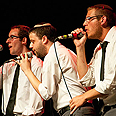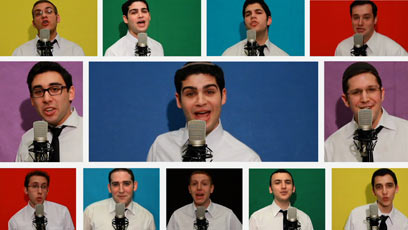
Their covers of classic Jewish, American, and Israeli songs are inspiring, energetic, and ridiculously catchy. In celebration of Hanukkah 2010, The Maccabeats released “Candlelight”, a hilarious version of Taio Cruz’s hit single “Dynamite.”
The YouTube video went viral almost instantly and has received over seven million hits. This past Hanukkah, the group released a second holiday single; a cover of Matisyahu’s “Miracle” with a brief cameo by their self-proclaimed biggest fan, Mayim Bialik.
Shalom Life had the opportunity to speak with The Maccabeats’ Ari Lewis, Barry Rosenberg, Yonatan Shefa, and Nachum Joel about how they formed, their success, and their plans for the future.
How was the group formed?
Ari Lewis: "In the fall of 2007, Michael Greenberg came to Yeshiva University and wondered why the flagship Jewish university did not have its own Jewish collegiate a cappella group like most other universities. So, he decided to email the student body in hopes of finding others out there who too wanted to join a club to sing a cappella.
"Those who responded to the email tried out for the group, and were simply called YU A Cappella. Back then we rarely performed, but the following fall, we decided to take things further and chose the name The Maccabeats as a play on the YU mascot name, The Maccabees.

'We just want to continue singing.' Maccabeats
"After gradually learning a range of songs for our repertoire, we began to perform at various YU functions. By the spring of 2010, we released our debut album 'Voices from the Heights' and our music video for our song 'One Day' (by Matisyahu), which comically portrays the story of our formation as a group."
Did you ever expect “Candlelight” to become as big as it did?
Ari Lewis: "We definitely had no clue how the video would be received. Our target audience was the Jewish community, but didn't expect anything beyond that. The fact that now there are non-Jews saying they wished they were Jewish after watching the video is a bit crazy, as well as satisfying knowing that we are spreading a good name for the Jewish people."
In your opinion, what is it about your music that draws people in the way it does?
Barry Rosenberg: "Our music is a blend of excitement and religious meaning. Music for us is much more than just the 'music' - it has the ability to be a meaningful spiritual experience as well. And we try to share that message in a fun, exciting, and accessible way - in a way from which everyone can take something. And of course, the fact that it's all a-cappella and no instruments really appeals to many of our listeners.
What was it like performing at the White House last year?
Barry Rosenberg: "In one word - surreal. It was a once in a lifetime experience that we can scratch off the bucket list. I mean, how many people do you know that met the president of the United States and got to perform in his house?!"
As a group, what would you say has been your most meaningful accomplishment?
Yonatan Shefa: "I think most of us would agree that our most meaningful accomplishment has been our ability to reach and affect such a wide audience. Initially, following the release of Candlelight, we received a lot of positive feedback from the religious Jewish community.
"However, as the video, and all subsequent videos continued to spread, Jews from all walks of life started telling us how proud our videos made them feel, and how we inspired them to observe holidays that they hadn't for a long time. We even started hearing from non-Jews from all over the world, who seemed to have a new appreciation for Judaism after watching our videos."
Seeing as members must be graduating as time goes on, how does it work finding new guys for the group?
Yonatan Shefa: "The group has always allowed members to remain in the group, even after graduating, as long as each person can still make the time commitment for practices and performances. It used to be that we would hold auditions for new members in order to fill the spots of those who did leave, but at this point, everyone is committed to remaining in the group."
Would the group be something you’d consider pursuing as a full-time career?
Nachum Joel: "We all love to sing, that's why we each joined this group. This has been an incredible journey so far and we continue to tour the world spreading our music to all types of people. But this is a hobby for us. It's been a huge part of our lives and we would love for it to last forever."
Do you ever get recognized in public?
Nachum Joel: "Believe it or not, we do get recognized pretty often. I've been recognized by Jews as well as non-Jews in restaurants, subways, and even airport bathrooms! But it's always humbling when people run into you and tell you how much they enjoy your music."
What’s up next for the Maccabeats?
Nachum Joel: "We are currently busy performing all over the country and are excited to be traveling to Hong Kong and New Zealand this February for a few performances. We are also working on our second CD and would love to get out some more videos. We just want to continue singing and spreading our music."
Reprinted with permission from Shalom Life















